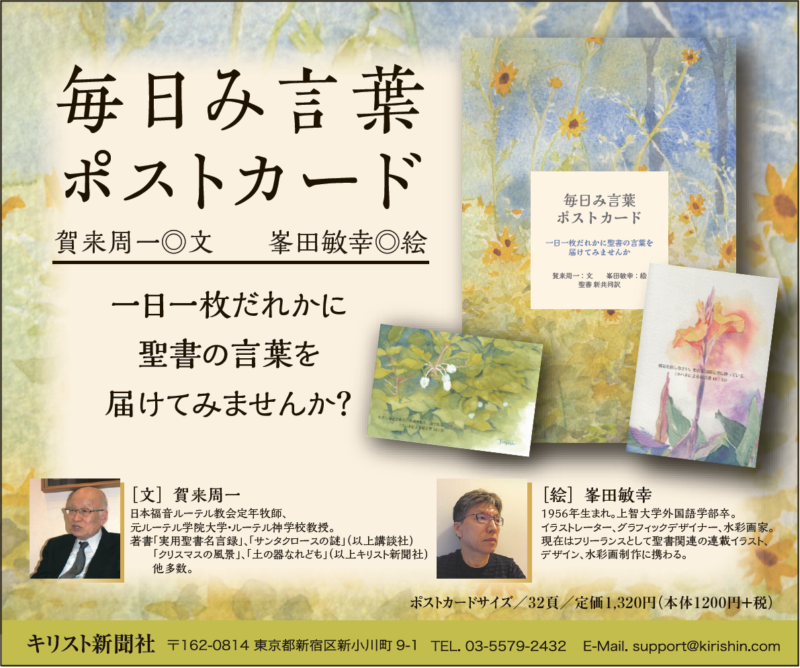「物の判断については子供となってはいけません」(1コリント14:20)。このパウロの忠告は、今日の私たちにとってさらに緊急性の高い課題となっている。悪に対しては子どものようになるべきでも、思考については大人になるべきだとパウロは主張した。そのため、「何を考えるか」だけではなく「どのように考えるか」についても人々に教えようと試みている。これはどんな時でも不可欠なことだ。「神学」、あるいは「神性」として体系づけられた学問は、この発想を引き継いだユニークな役割を持っている。
“Stop thinking like children.” Paul’s admonition to the Corinthians is even more urgent for us today. Though they should be like little children when it came to evil, he insisted they should be grown-ups when it came to thinking. To that end, Paul constantly tried to teach people not only what to think but how to think. This remains vital. The various disciplines grouped together as “theology” or “divinity” are uniquely positioned to continue this project.

(写真:Gareth Saunders)
現代の人々はよく、「いろいろな場面で丁寧で合理的な会話が減っている」と言う。神学は、そんな私たちに必要な「分野を超えた会話」のモデルを提示できる可能性を持っている。そこには、神学の本質が学問と現実世界のギャップを埋めることを使命とする以上の理由がある。
People today often comment about the decline of civil, reasoned conversation in all walks of life. Theology has an opportunity to model a genuinely interdisciplinary conversation of the sort we urgently need, not least because in its very nature it ought to bridge the gap between the academy and the larger world.
アウグスティヌス、トマス・アクィナス、ルター、カルヴァンなど、過去の偉大な神学者はみな、聖書や哲学、そして神学を対話の場で共有しようとした。これらの分野は、それぞれが深められれば深められるほど、互いを必要とするものだ。
The great theologians of the past—such as Augustine, Aquinas, Luther, and Calvin—all tried to bring the Bible, philosophy, and theology into a shared conversation. As each of these fields advances, they need one another all the more.
私たちの時代の挑戦
The Challenge of Our Time
批評家がどう言おうが、キリスト教の信仰は成長し、拡大している。ピュー研究所は、2050年のクリスチャン人口を30億人と試算している。その大部分は、高等教育を受ける機会がほとんどなく、神学教育もままならない国の国民だ。厳密な神学的研究がされなければ、広い視点から見た「世界の教会」において、歪められ偏った教えが広まる懸念は大きい。特に、世界が抱える大きな課題や、あらゆる世代や文化の変化に伴って新しいかたちで現れる課題に取り組むことはできないだろう。
Despite what cynical critics think, the Christian faith is growing and expanding. The Pew Research Center estimates that there will be 3 billion Christians by 2050, most of these in countries with little opportunity for further or higher education and minimal seminary provision. But without rigorous theological study, in its widest senses, the global church will be vulnerable to distorted or lopsided teaching. In particular, it will not be equipped to address the big questions that the wider world is asking and that emerge in new forms with every generation and every cultural shift.
過去の神学論文や聖書研究の良くない部分を知っている人は、しばしば懐疑的・挑戦的な態度で「神学から何か有用なことが学べるだろうか」と言うかもしれない。
Those familiar with some of the more negative theological writing and biblical scholarship of earlier generations, often skeptical and destructive in tone, may wonder whether anything helpful can now emerge from such disciplines.
もっと言えば、学問の分野が細分化し、増え続けることは、それぞれの分野が独立して進むことを意味する。聖書神学を含む聖書研究は、体系的・歴史的・哲学的神学が存在しないかのように行われることがある。神学者も、歴史的な聖書研究を無視して、時には「アクィナスやアウグスティヌスなどの偉大な聖書研究者を学べば十分だ」などと言い訳をする。
What’s more, ever-increasing academic specialization has meant that the different disciplines carry on in isolation. Biblical study, including biblical theology, often operates as though systematic, historical, and philosophical theology don’t exist. Theologians, in turn, ignore historical biblical studies, sometimes giving the excuse that they are studying Aquinas or Augustine (or whomever) and that since those great men read their Bibles intensively that is enough.
したがって、さまざまな分野の学者が互いのセミナーを行き来すると当然、「いったいこれは何だ」ということになる。社会を意識した神学研究は、世界中の一般信徒や教会に創造性豊かで建設的な手がかりを与えるかもしれない。しかし、そのような神学も、さまざまな分野の学者も、総体的な見方を失う危険性をはらんでいる。私たちに与えられているチャンスをものにする覚悟があるなら、この課題を避けて通ることはできない。
Thus, not surprisingly, when scholars from different fields sit in on one another’s seminars, we sometimes wonder what on earth is going on. This is a problem both for the disciplines themselves and for the kind of outward-facing theological study that might bring creative, constructive help both to churches and to ordinary Christians around the world. We must address these problems if we are to embrace the opportunities before us.
もし40年前に、「キリスト教の有神論によって、人生や世界、苦しみなどの大きな問題が解明され、対処する手がかりが示されるかもしれない」と提案したら、哲学研究者のほとんどに笑い飛ばされていたことだろう。しかし、これまで定着していた無神論にさまざまな問題が見えてきた今、有神論が再評価されつつある。
Forty years ago, most academic philosophers would have laughed at the suggestion that Christian theism might explain and address the big questions of life, the world, suffering, and so on. That laughter has turned to appreciation, as the earlier assumed atheism now appears more problematic.
新しく生まれた「分析神学」という運動は、以前から存在した懐疑論的な分析哲学の流れを汲(く)んでいる。まだ初期段階にあるこの運動では、信仰論を分解するためではなく、それを明確に言い表すために批判的思考を鋭く用いる。それが目指すのは、高い透明性、誠実さ、表現の明確さ、分析の厳密さ、そして議論の論理性だ。
A new movement, “analytic theology,” has emerged from the previously skeptical tradition of analytic philosophy. Still in its early stages, this movement uses the sharp tools of critical thought to articulate the faith rather than deconstruct it. It aims at transparency, accountability, clarity of expression, rigorous analysis, and logical argumentation.
1960年代と70年代の神学者の多くは、伝統的な信仰に対する「啓発的な」批判を前提として持っていた。今日、多くの人がその「啓発」自体に懐疑的な目を向けるようになり、伝統的な信仰論を新しい方法で表現する道を探している。
Likewise, many theologians in the 1960s and 1970s assumed an “Enlightened” critique of traditional beliefs. Many today have turned that skeptical spotlight back onto the Enlightenment itself, proposing fresh ways of expressing old beliefs.
部分的であれ、聖書学の分野でも同じことが言える。これまでの学者には、18世紀の条件に合うように聖書を切り取ろうとした者もいた。今は、それらの前提条件そのものが見直されようとしている。それは思考停止の原理主義に戻るためではなく、どのような時代にそのテキストが書かれたかをオープンな発想で探求するためだ。
The same is at least partly true in biblical studies. Some earlier scholars tried to cut down the Bible to fit 18th-century presuppositions. Now those presuppositions themselves are under scrutiny—not so that we might go back to an unthinking fundamentalism but so that we can explore in a more open-minded way what the texts were saying in their own time.
こういったことはすべて前向きな兆候だ。しかし、調和を持たせるよう努力する必要はある。そうでなければ、世界中の信仰で音楽のように豊かなハーモニーを作ることはできず、独りよがりなソロを歌うことになる。学術的なことには一生懸命になっても、自分の専門を超えた視野や興味を持っている学者はほとんどいない。
These are all signs of hope. And yet, without some attempt at integration, they may end up singing their solo parts instead of joining together to make the rich harmony that could reshape the music of faith around the world. We give lip service to interdisciplinary work, but few academics have the time or the interest to look beyond their own fields.
中には、米国のデューク大学、フラー神学校、ホイートン大学、イギリスのダラム大学、オックスフォード大学、オーストリアのインスブルック大学などのように、他の学問と協調した神学を教えているところもある。しかし、聖書学、哲学、そして神学者の協働を試みるプログラムはほとんどない。それが私たちの最も必要としていることだ。(後編へ続く)
Some programs, however, are working to integrate theology with other disciplines, including for instance those at Duke Divinity School, Fuller Seminary, and Wheaton College in the United States; Durham and Oxford Universities in Britain; and the University of Innsbruck in Austria. But few programs attempt what we badly need: the collaboration of scholars of the Bible, philosophy, and theology.
「クリスチャニティー・トゥデイ」(Christianity Today)は、1956年に伝道者ビリー・グラハムと編集長カール・ヘンリーにより創刊された、クリスチャンのための定期刊行物。96年、ウェブサイトが開設されて記事掲載が始められた。雑誌は今、500万以上のクリスチャン指導者に毎月届けられ、オンラインの購読者は1000万に上る。
関連



























